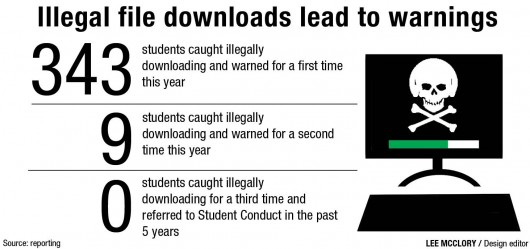If you’ve been downloading music illegally on campus, you might want to think again — there are companies watching.
While OSU’s wireless Internet is commonly used by OSU students to study, it’s also often abused. Pirating is an issue that OSU has to deal with, although a spokeswoman from the Office of the Chief Information Officer said the office does not supervise what students are looking up.
“We do not monitor students’ Internet traffic. We do monitor anything that accesses known dangerous websites that would indicate that a computer is compromised (web based botnets, for instance), but we aren’t watching what sites people go to,” said Katharine Keune, a spokeswoman for the OCIO, in an email.
One fourth-year student, who wished to remain anonymous because of his illegal downloading in the past, said being on OSU wireless does not affect his online habits.
“I’ve never been caught, but I’ve pirated for about five or six years fairly heavily,” he said.
Although the student said he stopped pirating about eight months ago, he said he didn’t only download items, including music and movies, illegally on OSU’s wireless, but over other wifi as well.
And he’s not the only one he knows who has pirated various types of media.
“I know two people who were caught and accused of pirating. One was warned by OSU Wireless that their activity had been detected. The other is off campus and is in an initial legal battle with the content owner,” he said.
He said the student in legal trouble is currently one of his roommates and the other student received an email from OSU saying that he would have to discontinue pirating or face prosecution and loss of service.
Keune said the most common “bad” thing students are doing online is downloading and sharing copyrighted material, such as songs or movies.
She said external companies monitor for the illegal activity.
“If they determine the offender is on OSU IP space, they send an infringement notice to OSU, at which point we look up the user that had that IP address at the time,” Keune said.
Keune said if it’s a student, the Office of Student Life has a process for dealing with the situation, and if it’s faculty or staff, the local IT staff is notified and departments deal with it through their own processes.
“The OCIO identifies to Student Life Technology Services … the individual whose wireless account was logged in when the material was shared,” Student Life spokesman David Isaacs said in an email.
The SLTS then contacts the user by email and explains the details of the offense and provides instructions for removing the material and the software used to share with others. So far this year there have been 343 first infringements, Isaacs said.
Second-time infringements result in another email from SLTS with the necessary actions the student must take, and the consequences for failing to comply. So far this year, only nine individuals have received a second infringement, Isaacs said. He said the necessary actions and consequences are explained after the offense takes place.
In cases where a third infringement occurs, the person must contact a manager with 24 hours. The files and software must be removed immediately and any further non-compliance results in suspension of network privileges and referral to Student Conduct. In the past five years, no one has had their network use suspended, Isaacs said.
Columbia University did a survey in 2013 that compared piracy in the United States to that of Germany. It found that about 70 percent of 18- to 29-year-olds in both countries said they had bought, copied or downloaded unauthorized music, TV shows, movies or other digital media.
Researchers also found that it was seen as “reasonable” behavior, by an average of 70-80 percent of people in the U.S. and Germany, to share music and movie files with family.
Still, it does not matter whose network someone is using, and the person doing the illegal activity is ultimately held responsible, said Frank LoMonte, a lawyer and the executive director of the Student Press Law Center, which is a legal assistance agency that works with student journalists.
“If the illegal downloading can be traced to you personally, then you are held legally responsible,” LoMonte said in an email.
He said it’s easier to get caught using a home Wi-Fi network, but it’s still possible to be caught using a public Wi-Fi network.
“The only difference is that if the student is using an Ohio State computer or the Ohio State network rather than the student’s own Internet service, then illegal downloading might also be a disciplinary violation in addition to being potentially a federal copyright violation,” he said.



